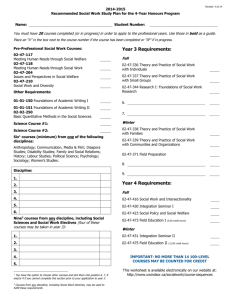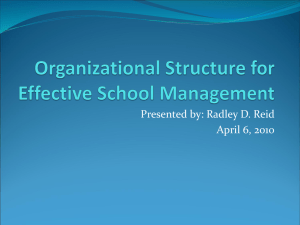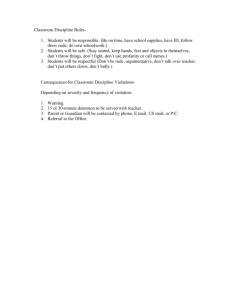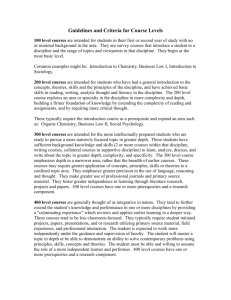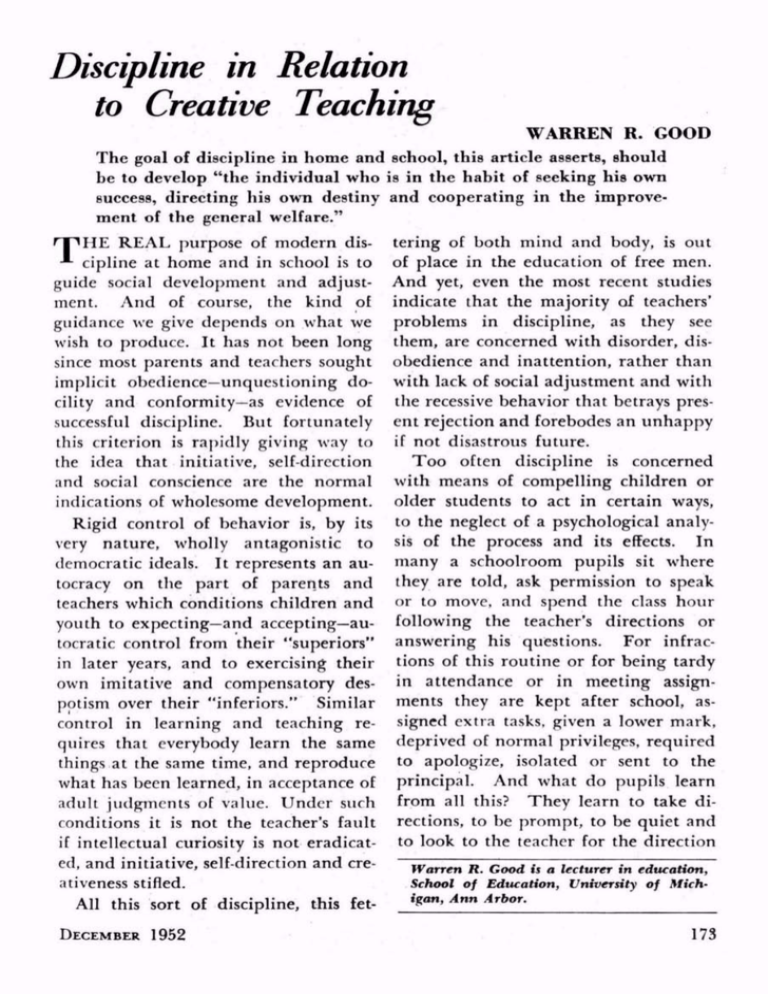
Discipline in Relation
to Creative Teaching
WARREN R. GOOD
The goal of discipline in home and school, this article asserts, should
be to develop "the individual who is in the habit of seeking his own
success, directing his own destiny and cooperating in the improvement of the general welfare."
E REAL purpose of modern discipline at home and in school is to
guide social development and adjust
ment. And of course, the kind of
guidance we give depends on what we
wish to produce. It has not been long
since most parents and teachers sought
implicit obedience unquestioning do
cility and conformity as evidence of
successful discipline. But fortunately
this criterion is rapidly giving way to
the idea that initiative, self-direction
and social conscience are the normal
indications of wholesome development.
Rigid control of behavior is, by its
very nature, wholly antagonistic to
democratic ideals. It represents an au
tocracy on the part of parents and
teachers which conditions children and
youth to expecting and accepting au
tocratic control from their "superiors"
in later years, and to exercising their
own imitative and compensatory des
potism over their "inferiors." Similar
control in learning and teaching re
quires that everybody learn the same
things at the same time, and reproduce
what has been learned, in acceptance of
adult judgments of value. Under such
conditions it is not the teacher's fault
if intellectual curiosity is not eradicat
ed, and initiative, self-direction and creativeness stifled.
All this sort of discipline, this fetDECEMBER 1952
tering of both mind and body, is out
of place in the education of free men.
And yet, even the most recent studies
indicate that the majority of teachers'
problems in discipline, as they see
them, are concerned with disorder, dis
obedience and inattention, rather than
with lack of social adjustment and with
the recessive behavior that betrays pres
ent rejection and forebodes an unhappy
if not disastrous future.
Too often discipline is concerned
with means of compelling children or
older students to act in certain ways,
to the neglect of a psychological analy
sis of the process and its effects. In
many a schoolroom pupils sit where
they are told, ask permission to speak
or to move, and spend the class hour
following the teacher's directions or
answering his questions. For infrac
tions of this routine or for being tardy
in attendance or in meeting assign
ments they are kept after school, as
signed extra tasks, given a lower mark,
deprived of normal privileges, required
to apologize, isolated or sent to the
principal. And what do pupils learn
from all this? They learn to take di
rections, to be prompt, to be quiet and
to look to the teacher for the direction
Warren R. Good is a lecturer in education,
School of Education, University of Mich
igan, Ann Arbor.
173
of activities and conduct. They may
also learn to be resentful, to avoid
teacher and task and to retaliate with
a variety of ingenious annoyances which
bring more punishment when the cul
prits are apprehended as, often, they
are not.
An Analytical V iew
In other schoolrooms the teacher
takes an analytical view of procedures
and a diagnostic attitude toward the
evidences of maladjustment that are
commonly called discipline problems.
Pupils sit or move about and talk with
others at their own decision, work much
of the time at tasks of their own choos
ing, plan undertakings and execute
them with'whatever advice they wish
to seek. There is no desperate rush
to be inside a door before a bell rings,
no schedule of punishments and no stu
dent police force watching the corri
dors during class hours. The sin of
tardiness is ignored unless it appears
to indicate a disregard for responsibil
ity, and then it is treated as a problem
in individual adjustment rather than
an offense against the school routine.
Breaches of good taste in social rela
tions are recognized as being due to
ignorance or to an unsatisfied need for
recognition, and are the basis for in
conspicuous educational treatment
rather than punishment. The activities
and the discipline display respect for
the dignity of the individual, and en
courage initiative, curiosity, self-direc
tion and social responsibility on the
part of each pupil.
When discipline is based on analysis
and diagnosis, the teacher considers his
proposed action from the standpoint
of the question, "What will the pupil
174
learn from it?" If he learns merely to
comply, or if he learns to resent his
treatment, to dislike the school and to
wish he could escape it all, the pro
cedure is inferior. If he learns to meet
his difficulties rationally, to accept re
sponsibility for the direction of his
own activities and conduct, and to act
in good faith for the welfare of him
self and his group, the procedure con
tributes to desirable social growth. It
is certainly not too broad a generaliza
tion to say that penalties and punish
ments are inferior instruments of dis
cipline. They are much too freely
used in schools, largely through the
persistence of traditions from European
countries which educated the masses
for subservience, and partly because
they are very obvious expedients re
quiring less intelligence and skill on
the part of the teacher than a rational
approach.
Mutual Respect and Tolerance
In a rational approach to discipline,
mere compliance is subordinate to un
derstanding. We want our children
to understand w hy certain modes of
behavior are followed, we want them to
question the reasonableness of things,
and we want them to have the habits
of finding out about things and mak
ing up their own minds. That is, we
want them to grow up as people who
have had much practice in planning
for the welfare of themselves and their
communities. Furthermore, we want
to be sure that the discipline of the
home and of the school does not inter
fere with that development by incul
cating an attitude of subservience to the
ideas and demands of an older genera
tion. That precaution implies no lack
EDUCATIONAL LEADERSHIP
of respect for one's elders; it suggests, that are educationally valuable and
rather, the cultivation of m utual respect socially worthy.
and tolerance.
Alertness to Personal Justice
Such attitudes toward discipline will
Concern with the immediate task
in themselves obviate many of the char
should not monopolize so much of the
acteristic disciplinary troubles that teacher's attention that he loses sight
plague the traditional teacher. They of the main objective: the development
place the emphasis on what the pupil of young people who can take hon
becomes, not merely on how he be
orable places in a society of free
haves. Many of the difficulties teachers men. These free men, of course, will
have with "discipline" are due to con
not really be free if they are gullible
flict between psychological needs of and unquestioningly obedient. Citizens
pupils and unwise provisions or re
who believe and do as they are told are
quirements in the classroom. Most especially susceptible to exploitation
prominent among these needs are the by economic and political vultures.
need for recognition and the need for Competent citizenship requires an
activity that challenges the interest and alertness to personal justice and a con
the ability of the pupil.
cern for the general welfare, that should
If the pupil who finds no interest in be exercised from the earliest years.
what he is supposed to do is so apa Clearly, therefore, the foundations in
thetic as to sit quietly, he causes no critical thinking and self-direction
trouble and may receive a high rating should be laid in the public schools,
in citizenship. But if he squirms and and the development nurtured there.
talks with his neighbor or invents con
Unless we are seeking to encourage
spicuous diversions he is likely to be humility and subservience, students
reprimanded or punished. It does not ought from childhood to compare
always occur to the teacher that the sources of information, to experiment
solution may lie in cooperative direc
with different ways of doing things and
tion of activity rather than in coercion. to have influential voices in deciding
Often the diversions .are of such na
what they are to do and how.
ture as to suggest that the major cause
The discipline of both the home and
is lack of recognition in the "legiti
the school should recognize the dignity
mate" activities of the class. Showing of each individual and his right to
off is merely an inexpert expression of seek recognition and direct his own
the commendable desire of us all to activities. The problems of inappro
lie respected and favorably recognized priate responses are problems for guid
by our fellows. Each of us needs to be ance, for education, not for coercion
important. The pupil who has a low and punishment. The goal is not the
measure of success with academic tasks person who will faithfully do as he is
may seek recognition through disturb
told, but the individual who is in the
ances or even in open rebellion. Every habit of seeking his own success, di
pupil needs the opportunity to suc
recting his own destiny and cooperating
ceed and to win approval in activities in improving the general welfare.
DECEMBER 1952
175
Copyright © 1952 by the Association for Supervision and Curriculum
Development. All rights reserved.





